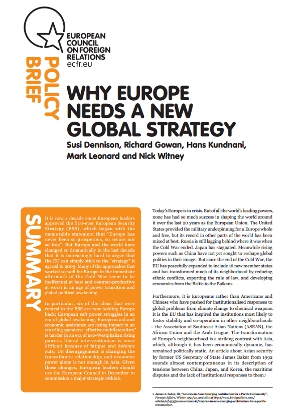Warum Europa eine neue Sicherheitsstrategie braucht
Auf dem Weg zu einer neuen EU Außenpolitik
Europa braucht eine neue Strategie für seine Außenpolitik. Vieles, was in der Vergangenheit gut funktioniert hat, ist heute, da die offizielle „Europäische Sicherheitsstrategie“ schon ein Jahrzehnt alt ist, ineffektiv und konterproduktiv geworden. Europa hat in der Außenpolitik empfindlich an Einfluss und Macht verloren und muss jetzt Prioritäten setzen. Die Tagung des Europäischen Rats im Dezember könnte dafür den Anfang setzen.
In diesem komplizierten und schmerzhaften Prozess ist Deutschland doppelt gefragt: einerseits gilt es, auch bei in unserem Land traditionell heiklen Themen, wie einem flexibleren „à la carte Multilateralismus“, Gesprächsbereitschaft zu zeigen. Andererseits ist jetzt die Gelegenheit, Deutschland neues Gewicht in der Union für eine echte Führungsrolle zu nutzen und damit die 28 Mitgliedstaaten zu einer gemeinsamen neuen Sicherheitsstrategie zu führen.
Der neue ECFR Policy Brief – Why Europe needs a new Global Strategy – identifiziert sechs zentrale Punkte der alten ESS, die Europa heute behindern und die es deshalb zu überdenken lohnt:
- Der europäische „Soft Power-Ansatz“ – sprich die Annahme, dass alle so werden wollen wie wir – hat es zunehmend schwer in einer Zeit des globalen politischen Erwachens und der Emanzipation von westlichen Einflüssen.
- Die Europäische Entwicklungs- und Wirtschaftshilfe verliert an Relevanz angesichts internationaler Geldgeber wie China, Russland oder Saudi-Arabien.
- Der von der EU postulierte „wirksame Multilateralismus“ erweist sich auf Grund des gestiegenen Souveränitätsempfindens der aufstrebenden Mächte als zunehmend undurchführbar.
- Überlastungen der Kapazitäten und massive Einsparungen in den Verteidigungshaushalten beschneiden die Möglichkeiten eines „liberalen Interventionismus“.
- Die regionale Neuausrichtung der US-amerikanischen Außenpolitik führt zu tiefgreifenden Veränderungen in den transatlantischen Beziehungen.
- Wirtschaftskraft allein reicht als Einflussfaktor in Asien nicht mehr aus.
Susi Dennison: “European soft power is a wasting asset in a world in which other regions and powers are increasingly self-confident and less willing to base their policies on relations with the West. The EU should not give up its values, but it does need to rethink how they can best be promoted at a time when ideological, financial and political competition in both Europe’s eastern and southern neighbourhoods is liable to remain high, and even grow, in the years ahead.” ([email protected]; +44 (0) 20 7227 6883 @sd270)
Richard Gowan: “Traditional multilateralism is not a reliable basis for strategy in a neo-Westphalian world. Europeans may increasingly have to go “forum shopping” to find alternatives to the UN when it is gridlocked over crises. But this à la carte multilateralism risks splitting the EU: France and the UK are typically more willing to manoeuvre around international legal obstacles than Germany.“ ([email protected]; +1 917 975 662 @RichardGowan1)
Mark Leonard: “No national government or global company would base its policies on a 10 year old strategy. The EU needs a new approach for an era of Chinese-led globalisation, American withdrawal and global political awakening where the very idea of soft power – the notion that people want to be like us – goes against the spirit of the times.“ ([email protected]; +44 07958725328; @markhleonard)
Hans Kundnani: “It is unrealistic to think that Europe could effectively withdraw from geopolitics and become a “European Japan” – one without the ability or will to use military power except in self-defence. Moreover, US disengagement means that Europeans will be expected to take responsibility for sorting out problems in their own neighbourhood.” ([email protected]; +44(0)7826844124; @hanskundnani)
Nick Witney: „The EU's 2003 security strategy is the product of a bygone age – a time when the West still ran the world, and the EU was half the size it is today. Brussels is scared to re-open it because it fears that today's 28 member states have very different world views. But that is exactly why we need the debate.“ ([email protected]; +44 7503 166740)
Der European Council on Foreign Relations vertritt keine gemeinsamen Positionen. ECFR-Publikationen geben lediglich die Ansichten der einzelnen Autor:innen wieder.

